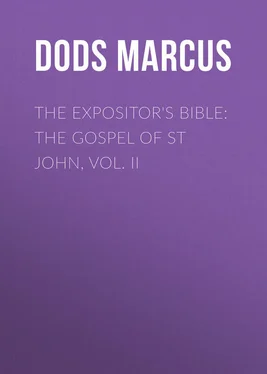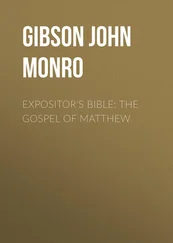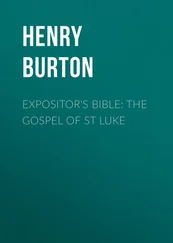Marcus Dods - The Expositor's Bible - The Gospel of St John, Vol. II
Здесь есть возможность читать онлайн «Marcus Dods - The Expositor's Bible - The Gospel of St John, Vol. II» — ознакомительный отрывок электронной книги совершенно бесплатно, а после прочтения отрывка купить полную версию. В некоторых случаях можно слушать аудио, скачать через торрент в формате fb2 и присутствует краткое содержание. Издательство: Иностранный паблик, Жанр: foreign_religion, foreign_antique, foreign_prose, на английском языке. Описание произведения, (предисловие) а так же отзывы посетителей доступны на портале библиотеки ЛибКат.
- Название:The Expositor's Bible: The Gospel of St John, Vol. II
- Автор:
- Издательство:Иностранный паблик
- Жанр:
- Год:неизвестен
- ISBN:нет данных
- Рейтинг книги:5 / 5. Голосов: 1
-
Избранное:Добавить в избранное
- Отзывы:
-
Ваша оценка:
- 100
- 1
- 2
- 3
- 4
- 5
The Expositor's Bible: The Gospel of St John, Vol. II: краткое содержание, описание и аннотация
Предлагаем к чтению аннотацию, описание, краткое содержание или предисловие (зависит от того, что написал сам автор книги «The Expositor's Bible: The Gospel of St John, Vol. II»). Если вы не нашли необходимую информацию о книге — напишите в комментариях, мы постараемся отыскать её.
The Expositor's Bible: The Gospel of St John, Vol. II — читать онлайн ознакомительный отрывок
Ниже представлен текст книги, разбитый по страницам. Система сохранения места последней прочитанной страницы, позволяет с удобством читать онлайн бесплатно книгу «The Expositor's Bible: The Gospel of St John, Vol. II», без необходимости каждый раз заново искать на чём Вы остановились. Поставьте закладку, и сможете в любой момент перейти на страницу, на которой закончили чтение.
Интервал:
Закладка:
The scene must have been one not easily forgotten. The Mount of Olives runs north and south parallel to the east wall of Jerusalem, and separated from it by a gully, through which flows the brook Kidron. The Mount is crossed by three paths. One of these is a steep footpath, which runs direct over the crest of the hill; the second runs round its northern shoulder; while the third crosses the southern slope. It was by this last route the pilgrim caravans were accustomed to enter the city. On the occasion of our Lord’s entry the road was probably thronged with visitors making their way to the great annual feast. No fewer than three million persons are said to have been sometimes packed together in Jerusalem at the Passover; and all of them being on holiday, were ready for any kind of excitement. The idea of a festal procession was quite to their mind. And no sooner did the disciples appear with Jesus riding in their midst than the vast streams of people caught the infection of loyal enthusiasm, tore down branches of the palms and olives which were found in abundance by the roadside, and either waved them in the air or strewed them in the line of march. Others unwrapped their loose cloaks from their shoulders and spread them along the rough path to form a carpet as He approached – a custom which is still, it seems, observed in the East in royal processions, and which has indeed sometimes been imported into our own country on great occasions. Thus with every demonstration of loyalty, with ceaseless shoutings that were heard across the valley in the streets of Jerusalem itself, and waving the palm branches, they moved towards the city.
Those who have entered the city from Bethany by this road tell us that there are two striking points in it. The first is when at a turn of the broad and well-defined mountain track the southern portion of the city comes for an instant into view. This part of the city was called “the city of David,” and the suggestion is not without probability that it may have been at this point the multitude burst out in words that linked Jesus with David. “Hosanna to the Son of David. Blessed is the King that cometh in the name of the Lord. Blessed is the kingdom of our father David. Hosanna, peace and glory in the highest.” This became the watchword of the day, so that even the boys who had come out of the city to see the procession were heard afterwards, as they loitered in the streets, still shouting the same refrain.
After this the road again dips, and the glimpse of the city is lost behind the intervening ridge of Olivet; but shortly a rugged ascent is climbed and a ledge of bare rock is reached, and in an instant the whole city bursts into view. The prospect from this point must have been one of the grandest of its kind in the world, the fine natural position of Jerusalem not only showing to advantage, but the long line of city wall embracing, like the setting of a jewel, the marvellous structures of Herod, the polished marble and the gilded pinnacles glittering in the morning sun and dazzling the eye. It was in all probability at this point that our Lord was overcome with regret when He considered the sad fate of the beautiful city, and when in place of the smiling palaces and apparently impregnable walls His imagination filled His eye with smoke-blackened ruins, with pavements slippery with blood, with walls breached at all points and choked with rotting corpses.
Our Lord’s choice of the ass was significant. The ass was commonly used for riding, and the well-cared-for ass of the rich man was a very fine animal, much larger and stronger than the little breed with which we are familiar. Its coat, too, is as glossy as a well-kept horse’s – “shiny black, or satiny white, or sleek mouse colour.” It was not chosen by our Lord at this time that He might show His humility, for it would have been still humbler to walk like His disciples. So far from being a token of humility, He chose a colt which apparently had never borne another rider. He rather meant by claiming the ass and by riding into Jerusalem upon it to assert His royalty; but He did not choose a horse, because that animal would have suggested royalty of quite another kind from His – royalty which was maintained by war and outward force; for the horse and the chariot had always been among the Hebrews symbolic of warlike force. The disciples themselves, strangely enough, did not see the significance of this action, although, when they had time to reflect upon it, they remembered that Zechariah had said: “Rejoice greatly, O daughter of Zion; shout, O daughter of Jerusalem: behold, thy King cometh unto thee: He is just, and having salvation; lowly, and riding upon an ass, and upon a colt the foal of an ass. And I will cut off the chariot from Ephraim, and the horse from Jerusalem, and the battle bow shall be cut off: and He shall speak peace unto the heathen.”
When John says, “these things understood not His disciples at the first,” he cannot mean that they did not understand that Jesus by this act claimed to be the Messiah, because even the mob perceived the significance of this entry into Jerusalem and hailed Him “Son of David.” What they did not understand, probably, was why He chose this mode of identifying Himself with the Messiah. At any rate, their perplexity brings out very clearly that the conception was not suggested to Jesus. He was not induced by the disciples nor led on by the people to make a demonstration which He Himself scarcely approved or had not intended to make. On the contrary, from His first recorded act that morning He had taken command of the situation. Whatever was done was done with deliberation, at His own instance and as His own act. 4 4 This is more distinctly brought out in the Synoptic Gospels than in St. John: cp. Mark xi. 1–10.
This then in the first place; it was His own deliberate act. He put Himself forward, knowing that He would receive the hosannas of the people, and intending that He should receive them. All His backwardness is gone; all shyness of becoming a public spectacle is gone. For this also is to be noted – that no place or occasion could have been more public than the Passover at Jerusalem. Whatever it was He meant to indicate by His action, it was to the largest possible public He meant to indicate it. No longer in the retirement of a Galilean village, nor in a fisherman’s cottage, nor in dubious or ambiguous terms, but in the full blaze of the utmost publicity that could possibly be given to His proclamation, and in language that could not be forgotten or misinterpreted, He now declared Himself. He knew He must attract the attention of the authorities, and His entrance was a direct challenge to them.
What was it then that with such deliberation and such publicity He meant to proclaim? What was it that in these last critical hours of His life, when He knew He should have few more opportunities of speaking to the people, He sought to impress upon them? What was it that, when free from the solicitations of men and the pressure of circumstances, He sought to declare? It was that He was the Messiah. There might be those in the crowd who did not understand what was meant. There might be persons who did not know Him, or who were incompetent judges of character, and supposed He was a mere enthusiast carried away by dwelling too much on some one aspect of Old Testament prophecy. In every generation there are good men who become almost crazed upon some one topic, and sacrifice everything to the promotion of one favourite hope. But however He might be misjudged, there can be no question of His own idea of the significance of His action. He claims to be the Messiah.
Such a claim is the most stupendous that could be made. To be the Messiah is to be God’s Viceroy and Representative on earth, able to represent God adequately to men, and to bring about that perfect condition which is named “the kingdom of God.” The Messiah must be conscious of ability perfectly to accomplish the will of God with man, and to bring men into absolute harmony with God. This is claimed by Jesus. He stands in His sober senses and claims to be that universal Sovereign, that true King of men, whom the Jews had been encouraged to expect, and who when He came would reign over Gentiles as well as Jews. By this demonstration, to which His previous career had been naturally leading up, He claims to take command of earth, of this world in all its generations, not in the easier sense of laying down upon paper a political constitution fit for all races, but in the sense of being able to deliver mankind from the source of all their misery and to lift men to a true superiority. He has gone about on earth, not secluding Himself from the woes and ways of men, not delicately isolating Himself, but exposing Himself freely to the touch of the malignities, the vulgarities, the ignorance and wickedness of all; and He now claims to rule all this, and implies that earth can present no complication of distress or iniquity which he cannot by the Divine forces within Him transform into health and purity and hope.
Читать дальшеИнтервал:
Закладка:
Похожие книги на «The Expositor's Bible: The Gospel of St John, Vol. II»
Представляем Вашему вниманию похожие книги на «The Expositor's Bible: The Gospel of St John, Vol. II» списком для выбора. Мы отобрали схожую по названию и смыслу литературу в надежде предоставить читателям больше вариантов отыскать новые, интересные, ещё непрочитанные произведения.
Обсуждение, отзывы о книге «The Expositor's Bible: The Gospel of St John, Vol. II» и просто собственные мнения читателей. Оставьте ваши комментарии, напишите, что Вы думаете о произведении, его смысле или главных героях. Укажите что конкретно понравилось, а что нет, и почему Вы так считаете.












